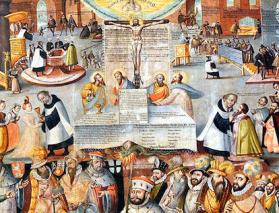Like many Catholic thinkers, Charles Taylor sees the Reformation as a crucial movement in the formation of the “secular age” of his most recent most massive title. Little of his discussion is absolutely new, but it is pithy and freshly stated, not to mention profoundly challenging for Protestants.
Taylor sees the Reformation as the culmination of a Reforming spirit that inspired movements throughout the later middle ages. At the heart of most of these movements was an aspiration to raise the level of piety not only among the clergy but among all Christians. Reform was not merely a return to the past but “an engine of genuine novelty and unprecedented change.”
The Reformation’s effort was more radical than previous Reform movements, and that because it not only sought to raise the level of piety within the existing sacramental system but assaulted that system at its foundations. Medieval Christians believed that “God’s power is somehow concentrated in certain people, times, places or actions,” spillage from the supreme power of the Mass, as one historian has suggested. Demons and black forces existed, but the church’s “white magic” countered them.
For the Reformers, “the practices of the sacred [were] an abomination . . . idolatry in the sight of God.” The system of the sacred put God at human disposal, robbing God of His Godness. Calvin sought to reduce Christian practice to essentials, insisting that God remain God, and humans utterly dependent on Him.
Along with this wholesale assault on ecclesial white magic, the Reformers rejected the various hierarchies (Taylor describes them in terms of equilibrium), that between clergy and lay or between religious and secular. “Priesthood of believers” was the battle cry. We’re all clerics now, as Luther put it. (One of the interesting consequences of this was the reclassification of all magic as Satanic and black.)
The Reformers sought to establish right order, right order in church and society, which depended on the rightly ordered affections and conduct of individuals. But this quest for order was unstable. If the demands placed on ordinary believers were too stringent, then they stood (as Sir Toby Belch said) as an “enemy to life.” Require too much renunciation, and living Christianly amounts to living inhumanly. On the other hand, if the Reformers relax requirements on the laity, they slip back into the hierarchical system that they aimed to overturn.
All this created conditions for the rise of what Taylor calls “humanism” or a “secular age.” With their attack on the sacred, the Reformers “disenchanted” the world, purged it of all pizzazz and spark. Commitment to root and branch Reform, and to order, in church and society made Protestantism susceptible to reforms the imposed uniformity and homogeneity.
Protestants were inclined to treat the world instrumentally, as building blocks for creating godly order, and often operated with the confidence that they, the elect, both knew what was to be done and were capable of doing it. In fairness, Taylor recognizes some of the same tendencies among Catholic Reform leaders, such as Charles Borromeo in Milan.
I think Taylor misses some crucial points. Calvin didn’t deny the hierarchy of pastor and people, but he denied that the hierarchy was a hierarchy of sacral status. Taylor acknowledges that Calvin continued to stress God’s action in space and time and matter, but he still distorts Calvin in a “spiritualist” direction.
The Reformers did not so much reject the category of “sacred” as relocate it: There was no longer a sacred charge in the altar or the relic but the Spirit dwelt in people and fed Christ to the faithful in bread and wine. Taylor’s portrait of Calvin sometimes looks like a bad photo of Barth.
Still, there is enough truth in Taylor’s account for Protestants to feel his pinch. And, in the light of the Calvinistic revival that has been taking place in evangelicalism for the past half century, the question is, What do we recover or renew, and how do we innovate so as to avoid the errors that Taylor and others identify?
Here are a few of many possible suggestions. First, we need to stress creation. I am not mainly talking about six-day creation, though that is part of the story. We need to acknowledge, in a more thoroughgoing way than our forefathers, that creation is good, very good, in all its contours and particulars, in all its color and tang, in every jagged edge and every smooth surface. To Calvin’s double knowledge we need to add a third: We cannot know God without knowing self, cannot know self without knowing God, and cannot know either without encountering God in His good creation. To Westminster’s chief end, we need to add enjoyment of God in His creation.
That is to say, we need to renounce every last vestige of Gnosticism, every hint of nature/grace dualism. Only on this basis will we be able to break through the logjam that Taylor identifies, the recurrent tension between being in the world and not of it, between “renunciation” for the sake of God’s kingdom and human flourishing.
Second, Taylor charges that Protestantism oscillates too between self-flagellation and supreme confidence: We are horrific sinners, but because God has chosen us we can do everything. In a sense, that is perfectly true, but those two sides of Protestantism are more deeply founded when we push back to creation. Every heartbeat, every wave of peristalsis, every beam of sun and every drop of rain glinting on every leaf, is an unutterable gift.
The more open space we allow between being created and being recipients of grace, the larger Taylor’s target becomes. There’s no need for any space at all. It is not only sinners who have nothing but what has been given, but creatures. It is grace, all grace, not just from the moment of the fall, but from the first fiat of creation week.
Third, and related to the first two, we need to stress time. The tension of renunciation and flourishing is a temporal or eschatological tension, not an “ontological” one. We renounce good things now for the sake of flourishing, superabundant flourishing, later. We take up the cross now because resurrection comes on the third day.
We need to recognize that any renunciation, any check on or discipline of desire, is for the sake of a more complete satisfaction of desire. Suppression of desire can only pervert desire. Desire is “disciplined” by desire, desire for things now channeled by overwhelming desire for better things later. Calvin knew that and said it repeatedly, but his eschatology instinctively moved toward heaven, rather than toward a new heavens and earth. God has promised that these satisfactions will be enjoyed both now and in a new creation.
OK, I’ll say it: We need to be postmil.
Finally, and related to both, we need a re(?)surgence of Eucharistic practice and piety. Nothing closes the gap between renunciation and human flourishing, between discipleship and delight in the world, more than a weekly meal with Jesus. At the table, we come to know that discipleship is a feast. Nowhere do we have the regular contact with God in material reality that we do in the bread and wine. Nothing will counteract the (too deserved) image of crusty Calvinism more than a rowdy weekly Eucharist.












